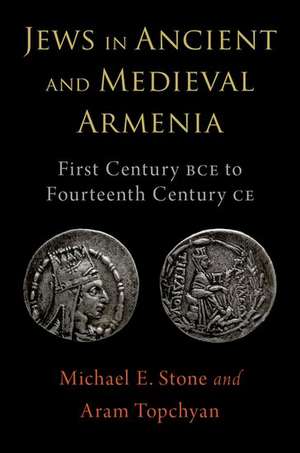Jews in Ancient and Medieval Armenia: First Century BCE - Fourteenth Century CE
Autor Michael E. Stone, Aram Topchyanen Limba Engleză Hardback – 28 sep 2022
Preț: 434.78 lei
Preț vechi: 483.81 lei
-10% Nou
Puncte Express: 652
Preț estimativ în valută:
83.22€ • 90.43$ • 69.95£
83.22€ • 90.43$ • 69.95£
Carte disponibilă
Livrare economică 19-25 martie
Preluare comenzi: 021 569.72.76
Specificații
ISBN-13: 9780197582077
ISBN-10: 0197582079
Pagini: 200
Dimensiuni: 216 x 147 x 18 mm
Greutate: 0.36 kg
Editura: Oxford University Press
Colecția OUP USA
Locul publicării:New York, United States
ISBN-10: 0197582079
Pagini: 200
Dimensiuni: 216 x 147 x 18 mm
Greutate: 0.36 kg
Editura: Oxford University Press
Colecția OUP USA
Locul publicării:New York, United States
Recenzii
This is a unique book dedicated to the historical ties between the two ancient peoples. By taking a critical approach and skillfully combining the often not-so-rich and precise information from multilingual historical sources, the authors have reconstructed and rediscovered the various relations between the Armenian and Jewish peoples from biblical times to the 14th-15th centuries, thereby providing the scholarly community and the general public with a comprehensive and high-level academic study.
This long-awaited book fills a gap in our understanding of Armenian history. Stone and Topchyan are to be commended for undertaking such an innovative project: by assembling and analyzing in a comprehensive way literary, epigraphical and archeological sources, they offer a new picture of the presence of Jews in ancient and medieval Armenia, which challenges traditional views. This important book is definitely required reading for anyone who is interested in the history of Armenian-Jewish contacts.
This is a significant work for those interested in both Jewish and Armenian history, as well as the entire Near East and the Caucasus during ancient and medieval times. While very detailed and chock full of information, the book tells a compelling and balanced story. We learn of the many interrelated aspects of Armenian and Jewish history in pre-modern periods – including clear evidence for long-thriving Jewish communities in historic Armenia.
This long-awaited book fills a gap in our understanding of Armenian history. Stone and Topchyan are to be commended for undertaking such an innovative project: by assembling and analyzing in a comprehensive way literary, epigraphical and archeological sources, they offer a new picture of the presence of Jews in ancient and medieval Armenia, which challenges traditional views. This important book is definitely required reading for anyone who is interested in the history of Armenian-Jewish contacts.
This is a significant work for those interested in both Jewish and Armenian history, as well as the entire Near East and the Caucasus during ancient and medieval times. While very detailed and chock full of information, the book tells a compelling and balanced story. We learn of the many interrelated aspects of Armenian and Jewish history in pre-modern periods – including clear evidence for long-thriving Jewish communities in historic Armenia.
Notă biografică
Michael Stone retired from the Hebrew University of Jerusalem as Professor of Armenian Studies and Gail Levin de Nur Professor of Religious Studies. His academic activities have been devoted to two different disciplines, Armenian Studies and Jewish literature and thought in the period of the Second Temple. His research and publication have been divided more or less equally between these two fields. He is one of the editors of the Dead Sea Scrolls.Aram Topchyan is Head of the Department of Secular Literature and Philology at the Mesrop Mashtots Research Institute of Ancient Manuscripts (Matenadaran), Yerevan, Republic of Armenia. He has written extensively on Greco-Roman and Early Medieval Armenian literature and has translated several important literary sources into English. He is also a prolific translator of world classics (from Classical Greek, Latin and English into Armenian): works by Hesiod, Pindar, Aeschylus, Sophocles, Euripides, Aristophanes, Apollodorus, Virgil, Ovid, MarcusAurelius, Chaucer, Marlowe, Shakespeare, and others.
